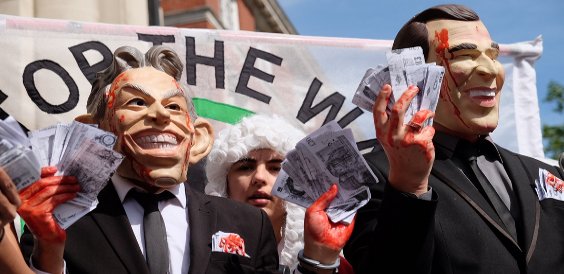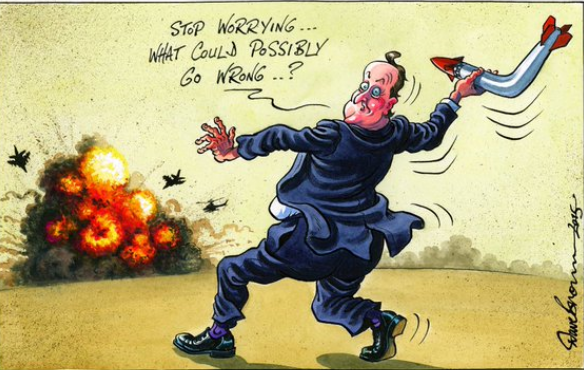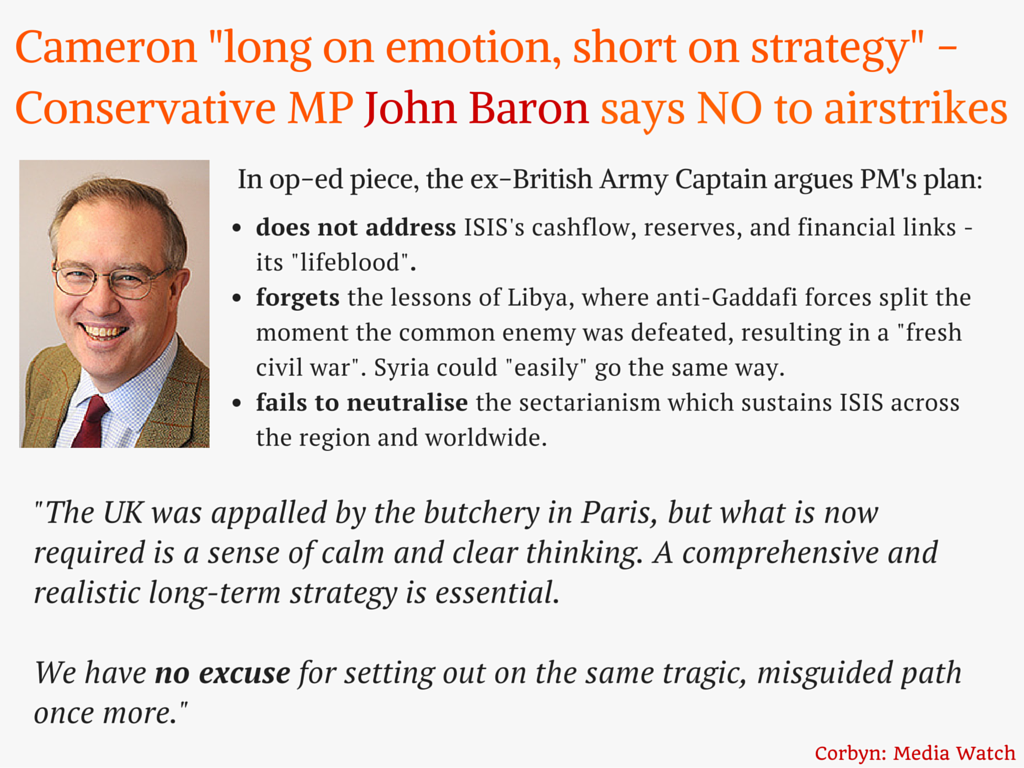By Daniel Margrain

On September 28, 2015, in a speech to the U.N General Assembly in New York, President Obama alluded to the ‘responsibility to protect’ (R2P) doctrine as the justification for regime change in Syria. Earlier that day at the Labour Party Conference in Brighton, the Blairite, Hilary Benn, was more explicit by actually citing the R2P doctrine by name as the justification to attack Syria.
Formulated at the 2005 UN World Summit, the version of R2P currently in vogue and proposed by the [Gareth] Evans Commission, authorises “regional or sub-regional organisations” such as NATO to determine their “area of jurisdiction” and to act in cases where “the Security Council rejects a proposal or fails to deal with it in a reasonable time”.
Having long been considered a norm in international affairs, R2P has – with the accompaniment of lofty rhetoric about the solemn responsibility to protect suffering populations – been used to illegally overthrow a series of sovereign states, most recently in Libya. The version of the R2P doctrine formulated at the UN World Summit will almost certainly be used to justify the illegal dismembering of Syria.
From the Iraq debacle onward, there has been an attempt by the Western powers to circumvent the consensus view of what constitutes illegality among the world’s leading international lawyers. But it has been post-Iraq that the justification to reject the consensus legal view has become codified.
The Caroline Principle
What has been termed the Caroline Principle has been used to establish the concept “anticipatory self-defense“. This sets an extremely dangerous legal precedent. The rejection of the consensus view of the world’s leading international lawyers, was initially outlined in a memorandum written by lawyer Daniel Benjamin, dated 7 June 2004.
It was from this memorandum that the concept of the Caroline Principle was developed and then absorbed into the UN Charter. Significantly, it is the conceptual re-evaluation of international law that’s posited by Benjamin in his memorandum that has come to dominate Western political discourse. A key part of the memo states:
“It must be right that states are able to act in self-defence in circumstances where there is evidence of further imminent attacks by terrorist groups, even if there is no specific evidence of where such an attack will take place or of the precise nature of the attack.”
It is this minority legal opinion that was used to justify the attack on Iraq after the event predicated on – as one administration official put it – “pre-emptive retaliation.” This, in short, is what defined the Bush Doctrine (enshrined in the National Security Strategy), and provided the catalyst for both G.W. Bush’s and Barack Obama’s geo-strategic ambitions. This became clear when the former announced what the Financial Times called “an entirely fresh doctrine of pre-emptive action” in a speech at West Point on 1 June 2002.
Acting pre-emptively, as a form of defense, is the cornerstone of the Caroline Principle in which a U.S ‘rule based’ policy (with the help of the ‘international community’), is intended to reshape the Middle East. As early as 2000, adviser to G.W. Bush, Condoleezza Rice, began to highlight ‘rogue states’ such as Iraq, Libya and Syria for regime change which essentially confirmed the alignment of the strategic interests of Israel with those of the United States.
The theory is that by working closely with Turkey and Jordan in order to foment the destabilization, principally, of Iraq and Syria, the United States and Israel will be able to ensure the balance of power in the region is maintained.
The regime change narrative is an agenda that allows Israel an element of autonomy – a clean break – achieved by means of a “strategic retreat by re-establishing the principle of pre-emption, rather than retaliation alone and by ceasing to absorb blows [to Israel] without response.”
The clean break strategy was at odds with Bill Clinton’s containment approach, which in terms of isolating Saddam had, by 1998, been a success, as weapons inspector Scott Ritter of UNSCOM confirmed. However, in January 1998, the Project for a New American Century sponsored a letter to Clinton denouncing the ‘failure’ of the policy of containing Iraq.
It declared:
“The only acceptable strategy is one that eliminates the possibility that Iraq will be able to use or to threaten to use, weapons of mass destruction. In the near term this means a willingness to undertake military action as diplomacy is clearly failing. In the long term, it means removing Saddam Hussein and his regime from power.”
The signatories read like a roll call of the Bush administration that would take office three years later.
The PNAC, in other words, marked the beginning in the shift of U.S strategy that ushered in the the conceptual reconfiguration of international law that was the precursor to the Caroline Principle outlined in the memorandum written by lawyer Daniel Benjamin dated 7 June 2004 outlined above.
Israel & energy independence
By facilitating the broader strategy to dismember Syria, the Caroline Principle will help usher in the granting of oil exploration rights inside Syria, by Israel, in the occupied Golan Heights, to the multinational corporation, Genie Energy.
Major shareholders of the company – which also has interests in shale gas in the United States and shale oil in Israel – include Rupert Murdoch and Lord Jacob Rothschild. Other players involved include the Israeli subsidiary, Afek Oil and Gas, American Shale, French Total and BP.
Thus, there exists a broad and powerful nexus of U.S, British, French and Israeli interests at the forefront of pushing for the break-up of Syria and the control of what is believed to be potentially vast untapped oil and gas resources in the country.
Against this are the competing agendas of the various belligerent gas-exporting foreign factions, that according to Orstein and Romer, have interests in one of the two gas pipeline projects that seek to cross Syrian territory to deliver either Qatari or Iranian gas to Europe.
As Orenstein explained:
“In 2009, Qatar proposed to build a pipeline to send its gas northwest via Saudi Arabia, Jordan, and Syria to Turkey… However, Syrian President Bashar al-Assad refused to sign the plan; Russia, which did not want to see its position in European gas markets undermined, put him under intense pressure not to”.
Russia’s Gazprom sells 80 per cent of its gas to Europe. So in 2010, Russia put its weight behind “an alternative Iran-Iraq-Syria pipeline that would pump Iranian gas from the same field out via Syrian ports such as Latakia and under the Mediterranean.” The project would allow Moscow “to control gas imports to Europe from Iran, the Caspian Sea region, and Central Asia.”
Meanwhile, across the Atlantic, major defense contractors Raytheon, Oshkosh, and Lockheed Martin assured investors that they stand to gain from the escalating conflicts in the Middle East. Lockheed Martin Executive Vice President Bruce Tanner said his company will see “indirect benefits” from the war in Syria.
In addition, a deal that authorized $607 billion in defense spending brokered by the U.S Congress, was described as a “treat” for the industry. What better way to benefit from this ‘treat’ than for the major powers to secure the hydrocarbon potential of Syria’s offshore resources with the aim of reducing European dependence on Russian gas and boosting the potential for energy independence?
The overriding of the consensus legal opinion in international law is intended to provide the legal justification for more conflict and instability in Syria and throughout the Middle East region. The long-term aim of the Western Israeli-Gulf axis is the overthrow of the Assad government in Syria which will provide the imperial powers with a gateway to Iran. Daniel Benjamin has assisted greatly in the metaphorical building of the road.
Please make a small donation
If you’ve enjoyed reading this or another posting, please consider making a donation, no matter how small. I don’t make any money from my work, and I’m not funded. You can help continue my research and write independently.… Thanks!






